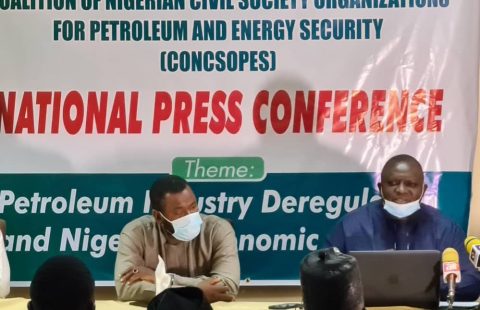Don’t Halt Deregulation Of Petrol, CSOs Tell FG
Business News, Featured, Latest Headlines, News Sunday, February 28th, 2021
A Coalition of Nigerian Civil Society Organizations for Petroleum and Energy Security (CONCSOPES) on Saturday sought the sustenance of deregulation of the price of the Premium Motor Spirit (PMS).
Speaking in a press conference in Abuja, the convener, Mr. Timothy Ademola, noted that a reversal of the deregulation that started in March 2020 will lead to scarcity of the product.
Besides, he said it will lead the Nigerian National Petroleum Corporation (NNPC) to negative financial records.
According to him, “With the agitation of labour for the roll back of deregulation, NNPC will inadvertently have to absorb the cost of the price differential between landing cost and pump price.
“This would most likely put NNPC in a very bad spot financially and eventually lead to a situation where it would be difficult to further import products. The obvious implication of that is fuel scarcity and the return of fuel queues”.
He noted that the organised labour is presently pressing for the reinstatement of petrol regulation. He urged them to partner the NNPC to attain a people – centred deregulation policy.
His words: “If this happens, organized labor that is presently resisting deregulation would be forced to castigate NNPC for not supplying enough fuel to guarantee zero fuel queues and for not making a profit at the end of its financial year.
” Truly, the situation calls for a new and bold approach. We suggest that Labour should not just constitute downright opposition to Deregulation but partner with Government on how best to achieve patriotic, people-centered Deregulation; leveraging the new Government policy for the soon resumption of Nigerian Refineries, the approval of Modular Refineries and the welcome development of Dangote Mega Refinery”.
Asked why the government would not rather wait for the operationalization of the refineries before effecting full deregulation, a member of the Coalition, Mr. Henry Adigun, said the Dangote product would not change the petrol price because crude oil is sold at international market rate.
He said there is never a time that customers will admit as right for effecting the policy. He advised that the citizenry endure the temporary change of policy in the downstream sector stressing that can result in price decrease in the long run.
Meanwhile, Ademola explained that the deregulation of petroleum downstream is supposed to bring about some sort of liberalization of the sector which would make it possible for all petroleum products marketers to source their products from anywhere and sell at any price dictated by prevailing market forces.
According to him, “the competition arising from that would have helped to force pump prices down to the benefit of the citizens.
” But the scarcity of foreign exchange has made it difficult for the marketers to import products, thereby making NNPC the sole importer in keeping with its statutory role as marketer of last resort”.
The convener insisted that: “It will do our nation much good if our respected labour leaders spearheading the resistance to deregulation would recognize that deregulation has largely stabilized petroleum products supply over this past year.
“Once the foreign exchange issue that has made it difficult for major and independent marketers to engage in importation of petroleum products is resolved, the other gains of deregulation will kick in and Nigerians will be better for it.
“The market stabilization that has been brought about by the past one year of deregulation is strong assurance that full deregulation is the way to go if Nigerians are to enjoy the full benefits of their hydrocarbon wealth.
” Resisting deregulation may only slow down our national progress in this regard”.
Earlier, he recalled that last week, the price of crude oil in the international market rallied to $65 per barrel, the highest in thirteen months.
This, according to him, was after oil price sank to sub-zero level in the wake of the Covid-19 pandemic in 2020.
He said “Ordinarily, for a country like ours that is heavily dependent on revenues from oil, the price rally should be good news as it portends more money for the government to provide social amenities for the welfare of the citizens.
” But this good news of crude oil price rally is dampened by the prospect of a rise in the pump price of Premium Motor Spirit (petrol).
“During the launch of the Nigerian Upstream Cost Optimization Programme (NUCOP) recently, both the Minister of State for Petroleum Resources, Chief Timipre Sylva, and the Group Managing Director of NNPC, Mallam Mele Kyari, hinted at the prospect of a rise in the pump price of petrol in the country in line with the deregulation regime in operation in the downstream, following the rise in the price of crude oil. Since then, the leadership of organized labour have been vigorously contending that a pump price increase would impose more hardship on Nigerians who are already battling the effect of a sluggish economy.
“In Nigeria, the deregulation of petroleum downstream and pump price increase have been very difficult issues that have generated a lot of conflict between the Government and Labour for close to two decades.
“Since 2004 when the Federal Government started the policy of selling the crude oil earmarked for local refining/consumption at international price, it created a situation where the landing price of petroleum products was higher than the regulated pump price of petroleum products in the country. “The old system where crude oil earmarked for local refining/consumption was sold to the NNPC at a subsidized rate was able to take care of price differential between landing cost and regulated pump price. With the new policy, a system of subsidy payment was introduced to take care of the price differential. But over time, the subsidy system became cumbersome and Government began to find it unsustainable.
“The various attempts to end the subsidy regime by deregulating the downstream became a constant subject of bitter conflicts between the government and labour sometimes resulting in debilitating strikes that crippled the national economy.
“In March 2020, Government finally took the bull by the horns and deregulated the downstream by taking advantage of the low oil prices induced by the Covid-19 pandemic.
“The Minister of State for Petroleum Resources and the Petroleum Products Pricing Regulatory Agency (PPPRA) stated repeatedly that going forward, the price of PMS would be determined by prevailing market forces. One of those forces is the price of crude oil.
“With the current rise in the price of crude oil, it is inevitable that the price of petrol would go up in the local market. More so when there is no provision in the 2021 Appropriation Act for subsidy payment”.
Related Posts
Short URL: https://www.africanexaminer.com/?p=60167






















